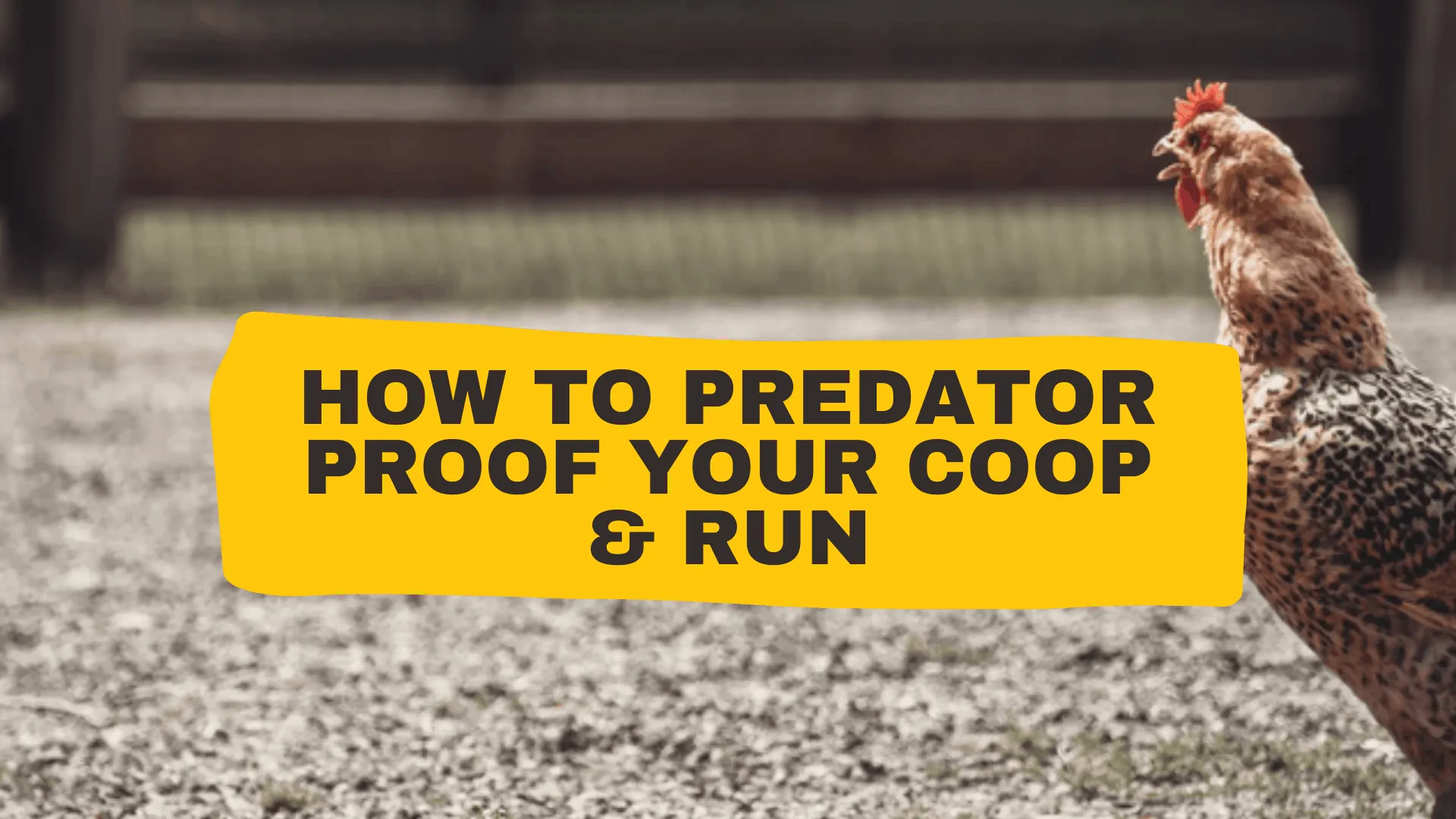If you keep a flock, I guarantee predators are lurking and watching your coop! No matter where you live – rural, urban, or somewhere in-between, something is licking its chops hoping for a free chicken dinner.
How to Predator Proof a Chicken Coop and Run There are many ways you can predator proof your coop, using decoys and adequate enclosures is the best way.
In this article, will go over why you need to predator proof, and what methods you can implement right now to keep your chickens safe.
Why Predator Proof?
There are plenty of predators that will happily hunt your girls and boys.
Foxes, coyotes, raccoons, skunks, mink, weasels, opossums, bobcats, fisher cats, bears, hawks, eagles, and more!
But I have found that the #1 predator that will decimate a flock is the domestic dog.
Dogs destroy more flocks annually than any other predator listed.
Once a predator attacks, it will return.
Sadly most flock owners do not think of predator proofing; first, it is usually only crucial after there has been an attack, and chicken lives were lost.
Coop and run security should be first on every flock owner’s mind.
Raise Your Coop Off the Ground
If it’s possible, raise your chickens coop of the ground. This will help prevent, snakes, and burrowing predators from gaining access to your hens.
Protect Your Chickens at Night
Once you have trained your chickens to go into their coop at night, adding an automated locking, and closing door will add a tremendous amount of security for your birds.
You should also consider lighting outside of the run to deter the creatures that prowl in the night.
Cover Your Windows and Vents
The coop portion of your setup should be solidly built already, not only to keep out the elements but the predators as well.
Any windows or vents should be covered with ½ inch hardware cloth, so even rats and snakes are kept at bay.
Lock Your Doors
I highly recommend having a locking door on the coop and to close it nightly for the safety of your birds.
An automatic chicken door is also an added layer of security, shutting either by solar or battery power before dark, in case you forget to lock the coop door.
Protect From Above
Having bird nets above your your run is a great deterrent from predators that attack from above. While it’s not always guaranteed to save them, it will certainly help.
Guard Animals
Adding a guard animal to your farm might be a great choice in protecting your flock.
We have a great list of perfect guard animals to help protect your flock.
Should I Free Range?
Free-ranging is wonderful for chickens if they are supervised or have guardian animals, such as a livestock dog, donkey, llama, goats, or geese.
If you are unable to have a guardian animal, the only free-range when you are home and can keep an eye on things
Why You Should Not Use Chicken Wire
Use hardware cloth, chain link fence, woven wire, cattle panels, or pallets then cover with chicken wire. You can get creative and still get the job done.
Chicken wire was designed to keep chickens in but not predators out! There is not one single chickenwire that will stop a predator from getting its claws in your birds.
I have personally had an opossum decapitate a hen through chicken wire, and dogs easily tear a hole through it, wiping out an entire flock of 20 birds in minutes.
In areas with extra-large predators, run an electric wire or net perimeter around your coop and pen.
You will forget, at some point! I have been there.
TIP: Make sure the lock on your coop door is not just a simple latch; raccoons can open a latch and help themselves in!
When it comes to the run, there are several things you can do to aid in security. Bury the wire in the ground, in an L shape to prevent digging in around 8 to 12 inches deep; you can line the fencing portion with rocks, cinder blocks, logs, or even bricks to avoid tearing or digging in. Make sure the run is set with sturdy treated wood posts or metal posts into the ground 12+ inches or even set with concrete. I have used tall T-posts to set my run in nice and sturdy.
Be sure the run is tall enough for you to walk into; it makes care more manageable and adds space when you add outer perches, branches, logs, and even old ladders for the flock to climb on. Chickens naturally roost up high, the higher you can place the roosts, the happier and safer they will be.
Make sure your run has a roof of some sort, many materials can be used; galvanized steel, shingles, plastic sheeting over fence wire or PVC hoops and even reuse old pallets for roofing. It doesn’t have to be pretty to get the job done! I have used 10×10 dog kennels with orange construction net across the top, it is ugly, but it worked.
Even if you do everything right, a run is tough to completely predator-proof.
Predator Deterrents
Even a very protective rooster is no match for a dog, fox or hawk!
- Solar predator lights that resemble eyes at night,
- ultrasonic barriers
- electric fencing around the entire coop/run set up,
- guardian dogs
- owl or hawk decoys
- coyote or other predator decoys
- predator scents, such as urine scents.
If you have persistent predators, I highly recommend live trapping and removal. Call your local wildlife authority or animal control for information.
TIP: you must move decoys around often to appear real. If you don’t predators will become accustomed to seeing it and will ignore them.
What Animal Can Chew Through Chicken Wire
When predator proofing your chicken coop and run you have to make sure that you are considering your environment and what animals are lurking around that could want to attack your flock. Having a predator proof fencing will save you from a lot of heartbreak.
Raccoons, Dogs, Opossums, Coyotes, Snakes, and many more species of animals can chew through chicken wire with ease.
If you want to reduce the chances of a predator gaining access to your birds, including hardware cloth in combination with chicken wire will slow down, and prevent many predators for entering the coop and run.
In Summary
Adding as much security in all ways, shapes and forms will help you keep your flock safe and give you peace of mind! Whether it is high and tight fencing, impenetrable coops, predator deterrents, or guardian animals, do the best you can; just remember that even the highest security coop and run can still be tested and possibly fail if a determined enough predator happens by.
| predator proof chicken coop locks |
| raccoon proof chicken coop latch |
| how to snake proof a chicken coop |
| predator skirt chicken coop |
| dog proof chicken coop |
| predator proof chicken tractor |
| predator proof chicken door |
| chicken flock protectors |
| farm dog to protect chickens |
| how to keep bears away from chickens |
| how to hawk proof a chicken run |
| predator proof fencing |
| predator proof chicken fencing |
| racoon proof chicken tractor |
| do chickens come when called |
| chicken wire under coop |
| how to get a chicken to come to you |
| chicken run with netting |
| training chickens to go in coop |
| how to acclimate chickens to new coop |
| raccoon proof latch |
OhCluck.com is a participant in the Amazon Services LLC Associates Program, an affiliate advertising program designed to provide a means for sites to earn advertising fees by advertising and linking to Amazon.com
Comments
0 comments

